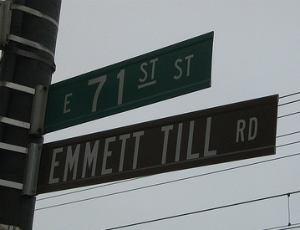Thomas Dyja discusses the impact of Emmett Till's murder in chapter 26, "What Kind of World Do World Do We Live In?" of The Third Coast. Read on to learn more about this momentous event.
The murder of Emmett Louis Till 60 years ago, on August 28, 1955, was the spark that ignited the civil rights movement.
Emmett Till was only 14 years old when he left Chicago to spend the summer at his uncle’s home in Money, Mississippi. One afternoon at a store there, Till spoke with a white woman, Carolyn Bryant; a few days later, Till was kidnapped and brutally murdered by Bryant's husband, Roy, and his half-brother J.W. Milam.
Till’s mother, Mamie Till-Mobley, insisted on a public viewing of her son’s tortured body in Chicago before his burial at Burr Oak Cemetery in Alsip. Photographs of Till’s mutilated body forced the country to see the horrors of racism. The national mood quickly turned to outrage when Bryant and Milam were acquitted of the murder by an all-white jury.
A hundred days after Till's murder, Rosa Parks refused to give up her bus seat for a white passenger. Parks was arrested for violating Alabama’s bus segregation laws. Her act of defiance marked the beginning of the civil rights movement. Years later, when asked why she didn’t go to the back of the bus, Parks responded, “I thought about Emmett Till and I just couldn’t.”
Emmett Till’s legacy lives on through memorials across the country. Chicago memorials include a seven-mile stretch of 71st Street renamed Emmett Till Road in 1991. The James McCosh Elementary School (South Champlain Avenue and East Marquette Road), which Emmett Till attended, was renamed the Emmett Louis Till Math and Science Academy in 2005.
Learn more about Emmett Till's legacy with these materials.
Archives
Dr. T.R.M. Howard Papers are an archival collection held at the Harsh Research Collection at Woodson Regional Library. Dr. Theodore Roosevelt Mason Howard was a physician, civil rights activist and entrepreneur. Following Till's murder, Howard became heavily involved in the search for evidence and gave over his home to be a “black command center” for witnesses and journalists. He gave dozens of speeches around the country, talking about Till’s murder and other examples of racial violence in Mississippi. In 1956 during a Ku Klux Klan reign of terror in Mississippi, Howard was forced to leave the state. He subsequently settled in Chicago.
The Richard Durham Papers are another archival collection held at the Harsh Research Collection. Richard Durham created Destination Freedom, a groundbreaking radio series that dramatized the struggle for civil rights in America. Included in this collection are letters from Mamie Till-Mobley to government officials requesting copies of all documents listed under the name of Emmett Till’s father, Louis Till. Durham helped Till-Mobley to draft these letters and urged her to submit them.
Online Resources
The Chicago Defender Historical Archive (1910-1975) and the Chicago Tribune Historical Archive (1849-1990) offer full-text access to these newspapers. Use these online resources to find articles about Till's death, its aftermath and his legacy.
Books
Mamie Till-Mobley offers her own point of view in Death of Innocence: The Story of the Hate Crime That Changed America. Till-Mobley died in 2003, the same year her memoir was published.
Harper Lee's To Kill A Mockingbird contains a story centered on the actions of a white attorney committed to defending a black man, Tom Robinson, accused of raping a white woman. Lee, whose novel had a profound effect on civil rights, has not publicly stated Robinson's origins, but there are several compelling similarities between Till's case and Robinson's.
Film and Music
The 1987 14-hour Emmy award-winning documentary Eyes on the Prize begins with the murder of Emmett Till. Accompanying written materials for the series, Eyes on the Prize and Voices of Freedom (for the second time period) exhaustively encompass the major figures and events of the civil rights movement.
When he was just 20 years old, Bob Dylan wrote the song "The Death of Emmett Till," available on The Bootleg Series. His lyrics try to capture the injustice of the crime.
Emmylou Harris' album Hard Bargain (2011) includes the song "My Name is Emmett Till." Harris recounts the murder in a plain-spoken narrative, as told from Till's perspective.




Add a comment to: #OBOC: Emmett Till’s Legacy